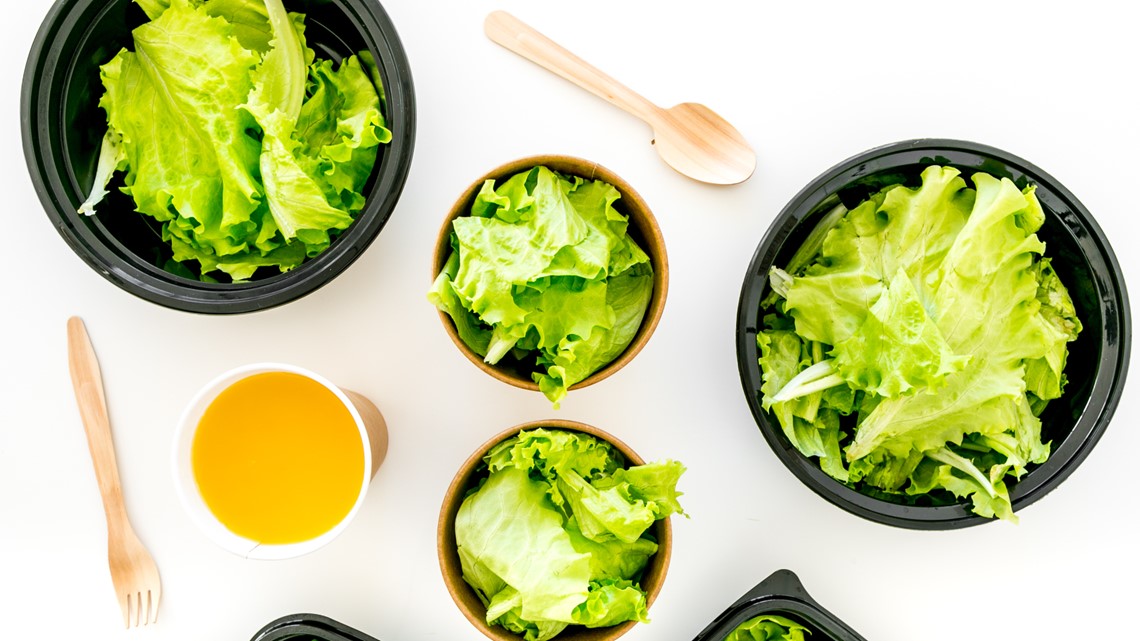Despite some online claims, there’s no evidence salad water can make you sleepy.
Chamomile tea, melatonin and warm milk are just some remedies people swear by to help them get to sleep. New to the insomniac remedy list — lettuce tea.
The idea of drinking lettuce tea to help people get to sleep caused a stir in May on TikTok when @shapla_11 steeped a couple of fresh lettuce leaves in boiling hot water, while adding peppermint tea for extra flavor. The London-based TikToker’s video was so popular it received more than one million likes. At the end of the video, @shapla_11 claimed that the lettuce tea helped her finally get some much-needed shut-eye.
THE QUESTION
Is there evidence drinking lettuce tea helps induce sleep in humans?
THE SOURCES
THE ANSWER
The viral TikTok claim that drinking lettuce water helps induce sleep in humans is misleading. Experts say there’s currently no evidence it will provide a sedative effect.
WHAT WE FOUND
In a 2017 study published in Food Science and Biotechnology, an international journal published monthly by the Korean Society of Food Science and Technology (KoSFoST), scientists investigated the sleep-inducing effect of lettuce varieties and the extracts derived from romaine lettuce on pentobarbital-induced sleep in mice. Then in a 2019 study published in the Biological and Pharmaceutical Bulletin, scientists investigated the effects of the extracts of green romaine lettuce on sleep enhancement in mice as well. According to both studies, when varieties of lettuce were administered to the mice orally, sleep latency and the duration time were significantly increased.
Dr. Michael Breus, who is known as “The Sleep Doctor,” told VERIFY that neither of the two studies provides enough evidence to show that lettuce tea or lettuce water actually helps with inducing sleep in humans.
“What we’re seeing here, unfortunately, I would say is people taking a little bit of science that looks like it could be promising and moving too far forward before we’ve had any real idea how to generalize this information to people one way or another. I would also argue that as of right now, if people are finding it to be effective, while I don’t have data to prove this, it feels far more like a placebo than it does to have any real active ingredients that are helping people with either falling asleep more quickly or extending their sleep duration,” said Dr. Breus.
Meanwhile, medical herbalist Todd Caldecott says the medicinal species of lettuce, known as Lactuca virosa or wild lettuce, is often extracted and concentrated and used as a “fairly useful” sedative compound. However, he says he doubts making tea out of “common lettuce” will have an “observable objective sedative effect.”
“You can extract the sesquiterpene lactones from [wild lettuce]. It used to be known as lettuce opium. So, maybe that’s where she kind of came across this,” Caldecott told VERIFY. “It’s also known as lactucarium, and we also use it for issues like whooping cough and any kind of respiratory irritation. So, it’s good when you have that problem like you can’t fall asleep because you have this nagging cough that keeps waking you up. However, when we’re using that as an extract, we’re making it pretty concentrated to even elicit a very mild effect.”
Breus and Caldecott both say while they would not recommend drinking lettuce tea to people to help them with their insomnia, they say there’s no real harm in consuming it.
“I want to be very clear, from a cultural standpoint, if this is something that has been passed down in your culture, and it helps you, go for it. I’m not the guy who’s gonna say, ‘No, no, no.’ What I am gonna say is, at best, we have limited evidence, limited scientific evidence to be able to show the efficacious nature of something like lettuce tea,” said Breus.
“Considering all the potentially problematic and dangerous things that people will take to help them sleep, boiling up some lettuce leaves seems pretty benign to me, it’s not likely to cause any problems — I can’t imagine it causing any problems,” said Caldecott. “I don’t think there’s any harm in anyone taking it, but I wouldn’t use it.”
More from VERIFY: Claim that eating french fries in moderation will lead to an early death is misleading
VERIFY
Our journalists work to separate fact from fiction so that you can understand what is true and false online. Please consider subscribing to our daily newsletter, text alerts and our YouTube channel. You can also follow us on Snapchat, Twitter, Instagram or Facebook.














































